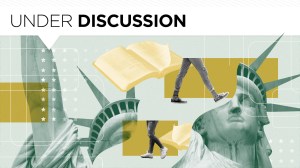In this series


Christianity Today asked a group of contributors how, if at all, the Bible should inform what a nation expects of immigrants. This is one of five essays in the series.
Those of us who grew up in the evangelical tradition are all familiar with proof texting. Whether it’s about drinking alcohol, gender roles, or predestination, most of us have, at some point or another, cherry-picked our favorite verses from Scripture and used them as weapons against those with whom we disagree.
In recent years, few issues have become more subject to proof texting than illegal immigration. Those who favor amnesty point to the many Old Testament commands to welcome the alien and stranger in our midst; those who support deportation point to New Testament verses where Paul directs churches to obey the temporal authorities of the Roman Empire.
Although both sides may be driven by a desire to obey Scripture, proof texting and cherry-picking rarely, if ever, provide us with sound answers. If we truly want to honor God, we must take the witness of the entire Bible into account—starting with the very first chapter.
In Genesis 1, we learn that “God created mankind in his own image” (v. 27), which is the basis for the historic doctrine of the imago Dei. This belief that each person is made in God’s image establishes the basis of every person’s identity and has inspired generations of activists to defend human dignity.
As I reflect on the border crisis and how some of the most vulnerable people impacted by COVID-19 are immigrants working in essential jobs, I’m reminded not just of the individual aspect of the imago Dei, but of its communal aspect as well. God is a triune God—one who, from the beginning of time, has revealed himself as three persons, co-equal in glory, majesty, and love. God made us to be in relationship with him and also to be in relationship with one another.
Trinitarian theology should inform our approach to immigration policy. We are responsible to one another and responsible for one another. We share in each other’s joys and in each other’s sufferings (1 Cor. 13). When we speak out and say that the things as they are now are not the way they should be, we’re pointing to a better way, to a hope that resides in the coming of the kingdom of God.
We have a responsibility to each other. We have a responsibility to immigrants.
Crucially, Christ’s command to bear with one another in love and to love our neighbors as ourselves comes right before he is betrayed and handed over to his sacrificial suffering and death. Christ calls us to love one another in John 15, but then he immediately shows us what that love looks like. It is a love that sacrifices and a love that costs—and it is the only kind of love that is sufficiently powerful to reconcile us to God and to each other. The calls to Trinitarian unity and respect for one another can only be rightly understood in context with Christ’s death on the cross.
As soon as God creates man imago Dei, he institutes marriage and the family as the basic institution of human flourishing. By deporting individuals who have been here for decades— many of whom were born or brought here through no choice of their own—we drive a wedge between those whom God intends to be together, creating trauma and pain that can cycle forward for generations.
With the dignity given to them by God, migrants have a responsibility to the receiving country as well. We live in a prosperous nation that guarantees freedom of religion and freedom of speech. It is unsurprising that so many want to come here and understandable (if heartbreaking) that they’ll do anything to get here. But just as we fail to honor migrants when we tear their families apart, it’s also fair to expect immigrants to be law-abiding, contributing members of society through work, support for their families, and community integration.
Several DACA (Deferred Action for Childhood Arrivals) recipients who work at World Relief are already helping provide immigrant legal services in several of our US offices. Ana Jara, for example, has helped many in southern California fill out various applications to get a green card or to naturalize. Thousands of others continue to pursue higher education, serve in our military and open restaurants and small businesses, while others are leading churches and discipling hundreds to follow Jesus.
Pastor Noe Carias received national attention when, after living in the United States for 25 years and pastoring a vibrant Assemblies of God church in Los Angeles, he was detained and ordered to be deported from the United States. After advocacy from many in Southern California, as well as the head of the Assemblies of God, George Wood, Carias was released in September. Jara and Carias exemplify in so many ways the many immigrants who are contributing economically, socially, and spiritually to our country.
A growing number of evangelicals are calling for a middle way on immigration reform. Based on the recognition that we all are made in the image of God and are responsible to one another for our choices, many church leaders have affirmed an Evangelical Call for Restitution-Based Immigration Reform. This approach rejects both amnesty and mass deportation as overly simplistic, and instead creates a path where migrants who have entered illegally or overstayed their visas can admit their violation of law, pay a series of fines over the course of seven years, and eventually work their way toward becoming a Lawful Permanent Resident, all contingent on paying taxes and maintaining a good record without serious criminal convictions.
It’s an approach, in short, that combines justice and mercy, compassion and equity, dignity and responsibility—an approach that honors the difficult and paradoxical call of Christ on our lives. Just as our reconciliation with God came at a cost, so likewise must the reconciliation between migrant and state comes at a cost. My hope is that more believers will investigate restitution-based immigration reform and share their support of it with their elected officials.
Above all, however, I hope that we can begin to look beyond the individualistic model of contemporary American culture and remember that we are made in the image of a triune God who created, redeemed and sustains us as we continue to fight for a more perfect union.
Jenny Yang is vice president of advocacy and policy at World Relief and the coauthor of Welcoming the Stranger: Justice, Compassion and Truth in the Immigration Debate.













